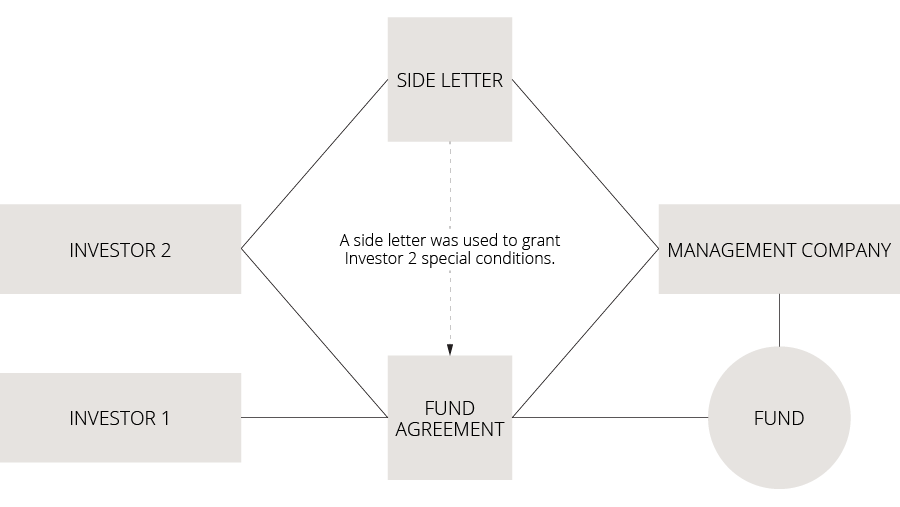Side letter agreements are a common way to agree on special conditions granted to certain investors concerning private investment funds. Fund managers should be familiar with the practices and the regulation relating to side letters and exercise caution when approving side letter requests.
Side letter agreements require expertise and diligence from the fund manager


What is a side letter?
Side letters are used particularly in conjunction with closed-end funds where the negotiation of the contract provisions is of high importance, considering that the rights to withdraw from such funds are limited and that the structure of these funds is complex. Open-ended funds (such as hedge funds) also typically utilise side letters, for example when a seed investor or cornerstone investor who is subject to special tax or regulation requirements is making a significant investment and requires customised special conditions.
A side letter can be used to supplement and amend the provisions of a fund’s constitutional document (such as the fund agreement of a limited partnership fund). Side letters are typically required when an investor has particular commercial, legal, tax-related or operative concerns about investing in a fund. Sometimes a side letter is mandatory so that the investor can join the fund in the first place due to the special provisions applied to the investor or the commitments the investor has made to other parties (such as the investor’s own investors). On the other hand, the investor often has an incentive to negotiate a set of agreements that suits them best both commercially and legally.

The parties to a side letter
If the fund is structured as a limited partnership, side letter arrangements are typically made between a general partner acting on behalf of the fund and individual investors. If the fund is a Finnish special investment fund, the parties to the side letter are the investor and the alternative investment fund manager on behalf of the special investment fund. In limited partnership funds, some investors can request that the alternative investment fund manager and the investment manager become additional parties to the side letter in order to facilitate the enforcement of the provisions concerning the operations of the said parties. Therefore, side letters should be drafted carefully to ensure that the correct parties are bound by them.
A fund agreement may not be amended without the consent of the investors unless it is specifically provided for in the fund agreement. This being the case, while a side letter can be used to amend certain provisions of the fund agreement between a general partner and an individual investor, it cannot be used to supersede the interests of other investors or to amend the fund agreement in relation to other investors.
The right to make side letters must be provided for in the fund agreement
The fund agreement must include a provision that explicitly allows the fund’s general partner and individual investors to enter into side letter agreements that change the conditions of the said investor’s fund investment in relation to the provisions under the fund agreement. The explicit authorisations for entering into side letter agreements that are provided for in the fund agreement play an important role, particularly when foreign institutional investors demand separate legal opinions on the enforceability of side letters.
The fund agreement clause authorising the making of side letters can limit the special conditions that a general partner may grant the investors, although the market practice is to draft the authorisation clause to be very broad. In any case, this clause must allow not only side letters but also the types of conditions that the general partner can propose to the investors (or at least it should not prohibit them).
Regulation ensures the equal treatment of investors
In addition to the commercial and practical aspects of making side letters, fund managers should pay attention to the associated regulatory issues. Fund managers must comply with provisions on preferential treatment of the Alternative Investment Fund Managers Directive (2011/61/EU, ‘AIFMD’) which have been implemented into to the Act on Alternative Investment Fund Managers (7 March 2014/162). Pursuant to the AIFMD, investors must be provided with ‘a description of how the AIFM ensures a fair treatment of investors and, whenever an investor obtains preferential treatment or the right to obtain preferential treatment, a description of that preferential treatment, the type of investors who obtain such preferential treatment and, where relevant, their legal or economic links with the AIF or AIFM’. This disclosure obligation is in force before the investment is made and also after any material changes to the preferential treatment. There are several ways to carry out the disclosure obligation.
Legal risks associated with side letters
The most important goals of fund managers are to raise capital and to acquire new investors. They might therefore be very tempted to approve side letter requests from investors who are ready to make a large investment in the fund. This kind of situation may be at hand particularly when an investor demands a side letter just before the fund is closed, allowing the investor to gain an advantage on the fund manager due to urgency. The risks associated with side letters should be kept in mind when negotiating and drafting them.
First, it is important to understand that once a side letter is made, the fund manager may have two competing obligations: 1) the obligations towards all investors pursuant to the fund agreement, and 2) the obligations towards an individual investor pursuant to the side letter. In a conflict situation, the provisions of the side letter will generally prevail. The fund manager can usually balance these competing obligations. For example, if the fund manager waives their fee with respect to a specific investor in full or in part, usually there will be no significant conflict as the exception does not have a detrimental impact on the other investors.
However, some common side letter arrangements may cause potential legal problems to fund managers. If, for example, the side letter allows an investor to withdraw from the fund prematurely, the fund manager may need to respond to an action on not fulfilling their duty of care towards the other investors as the other investors can claim that the side letter has put them in a materially unfavourable position. Legal evaluation is also necessary for such side letter conditions that grant the investor rights to the distribution of funds deviating from the fund agreement or that mitigate the investor’s payment obligations towards the fund, as this might lead to an increase the other investors’ relative payment obligations.
Prepare for side letter arrangements in advance and draft them carefully in writing
Although fund managers may be tempted to approve side letter requests, it is recommended to use appropriate consideration and care in approving the requests. A clear strategy for side letters should be a part of the fund establishment from the start. It is recommended to prepare a roadmap that determines the most likely recipients of side letters and the conditions they may be granted.
The fund’s constitutional document, and preferably the private placement memorandum as well, should contain an appropriately formulated clause to inform the investors that the fund manager can make side letters with individual investors.
Fund managers must also ensure that they do not make oral agreements. All side letters that concern amending or supplementing the fund agreement provisions should be made in writing. Often the investors asking for side letters will require this in any case, but it is important for fund managers to refrain from making vague promises. This also applies to any email correspondence between the fund manager and a potential investor on the interpretation of the fund agreement provisions. It can be unclear whether this constitutes a binding agreement.
When assessing each side letter request, the main concern of fund managers is to see whether the conditions of the proposed side letter impact their duty of care towards the other investors. If the conditions of the side letter do not affect the other investors, there should be no trouble. The assessment of situations that are not as clear, such as the customised requirements of large foreign institutional investors, may require specialised legal advice.
Read our previous blogs on funds:
Special investment funds also work as closed-end funds – pay attention to special provisions
















